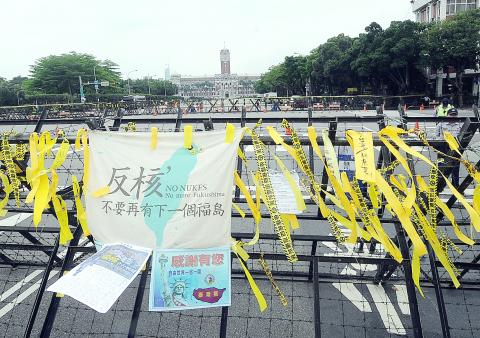More than two dozen researchers at the Academia Sinica released a joint statement yesterday, calling for political parties to establish a workable and reasonable mechanism for a national referendum on construction of the Fourth Nuclear Power Plant before the facility becomes operational.
“There is still time for rational discussions before the power plant at New Taipei City’s Gongliao District (貢寮) becomes operational,” said the joint statement of 25 researchers, released on the same day as an anti-nuclear rally in Taipei yesterday.
The petitioners included Academia Sinica President Wong Chi-huey (翁啟惠), National Taiwan University president Yang Pan-chyr (楊泮池), 1986 Nobel Prize in Chemistry laureate Lee Yuan-tseh (李遠哲) and former department of health director-general Chen Chien-jen (陳建仁).

Photo: Fang Pin-chao, Taipei Times
Taiwanese worry about the controversial power plant for good reasons, the researchers said.
Initiated in the 1980s, the project was suspended after the Chernobyl nuclear disaster in 1986 and again halted in 2000 under the Democratic Progressive Party administration. With various contractors brought in to build the plant in different stages, Taiwan’s ability to deal with a nuclear emergency would be in question, the statement said.
Additionally, the researchers said that the government has never formulated a complete set of energy policies that include plans to reduce carbon emission and to develop renewable energy sources.
Nor does the government have the know-how to process nuclear waste with current nuclear waste storage facilities in Taiwan almost at full capacity, they said, adding that methods the nation used to deal with the waste — ocean disposal or burial and exporting — were expensive.
More importantly, there are six nuclear reactors in Taiwan among the 12 most dangerous reactors listed in a 2011 Natural Resource Defense Council report as being in very high seismic hazard areas, the statement said.
“A nuclear crisis, be it the result of a natural disaster or human error, in northern Taiwan would be devastating,” they said.
While some countries not in the seismic zones listed nuclear energy as one of their solutions for carbon emission reduction, nuclear energy would be a risky option for Taiwan, the statement said, adding that the government should work diligently on risk assessment and development of renewable energy sources.

The manufacture of the remaining 28 M1A2T Abrams tanks Taiwan purchased from the US has recently been completed, and they are expected to be delivered within the next one to two months, a source said yesterday. The Ministry of National Defense is arranging cargo ships to transport the tanks to Taiwan as soon as possible, said the source, who is familiar with the matter. The estimated arrival time ranges from late this month to early next month, the source said. The 28 Abrams tanks make up the third and final batch of a total of 108 tanks, valued at about NT$40.5 billion

Two Taiwanese prosecutors were questioned by Chinese security personnel at their hotel during a trip to China’s Henan Province this month, the Mainland Affairs Council (MAC) said yesterday. The officers had personal information on the prosecutors, including “when they were assigned to their posts, their work locations and job titles,” MAC Deputy Minister and spokesman Liang Wen-chieh (梁文傑) said. On top of asking about their agencies and positions, the officers also questioned the prosecutors about the Cross-Strait Joint Crime-Fighting and Judicial Mutual Assistance Agreement, a pact that serves as the framework for Taiwan-China cooperation on combating crime and providing judicial assistance, Liang

A group from the Taiwanese Designers in Australia association yesterday represented Taiwan at the Midsumma Pride March in Melbourne. The march, held in the St. Kilda suburb, is the city’s largest LGBTQIA+ parade and the flagship event of the annual Midsumma Festival. It attracted more than 45,000 spectators who supported the 400 groups and 10,000 marchers that participated this year, the association said. Taiwanese Designers said they organized a team to march for Taiwan this year, joining politicians, government agencies, professionals and community organizations in showing support for LGBTQIA+ people and diverse communities. As the first country in Asia to legalize same-sex

MOTIVES QUESTIONED The PLA considers Xi’s policies toward Taiwan to be driven by personal considerations rather than military assessment, the Epoch Times reports Chinese President Xi Jinping’s (習近平) latest purge of the Chinese People’s Liberation Army (PLA) leadership might have been prompted by the military’s opposition to plans of invading Taiwan, the Epoch Times said. The Chinese military opposes waging war against Taiwan by a large consensus, putting it at odds with Xi’s vision, the Falun Gong-affiliated daily said in a report on Thursday, citing anonymous sources with insight into the PLA’s inner workings. The opposition is not the opinion of a few generals, but a widely shared view among the PLA cadre, the Epoch Times cited them as saying. “Chinese forces know full well that